Director – Christopher Murray – 2023 – Chile, Mexico, Germany – Cert. 15 – 100m
*****
When the father of an indigenous Christian convert is murdered by her German Christian employer’s dogs, her thirst for justice leads her to employ occult folk magic against his family – out in UK cinemas on Friday, June 14th
1881. Chiloé, the Northernmost island of an archipelago off the coast of Chile. Indigenous, 13-year-old Rosa (Valentina Véliz Caileo) works as a maid for German immigrant Stefan (Sebastian Hülk from All Quiet on the Western Front, Edward Berger, 2022; Little Joe, Jessica Hausner, 2019; The White Ribbon, Michael Haneke, 2009) who together with his wife (Annick Durán) runs a sheep farm. The couple have two young boys, Thorsten (Matías Bannister) and Franz (Iker Echevers). The family are Christians, and Rosa is a convert to that religion.
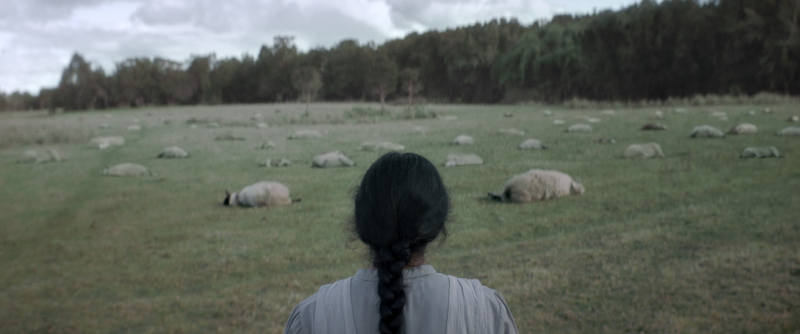
One day, Stefan’s sheep lie dead in his field, with woven garlands of vegetation round their necks. With tensions understandably high, Rosa’s father approaches Stefan holding a knife, and Stefan releases his two dogs upon him, killing the man. Rosa later places a makeshift cross of two sticks bound together on his basic grave, which she and Stefan’s family visit, Stefan’s wife pointing out that the man wasn’t a Christian.
Feeling unable to keep working for the family, Rosa leaves, sheltering by a makeshift fire in a cave by night, where a bird caws purposefully at her, and walking by the sea by day. She goes to the indigenous mayor (Daniel Muñoz from Land and Freedom, Ken Loach, 1995, and numerous Chilean productions) for help, but he has no intention of rocking the boat and upsetting the locals’ fragile relationship with the German immigrants. Also, as he bluntly points out, fathers die, and he is unable to resurrect the dead. Next, she goes to the local priest, and asks why God lets dogs kill people. He let nails kill Him, comes the reply.
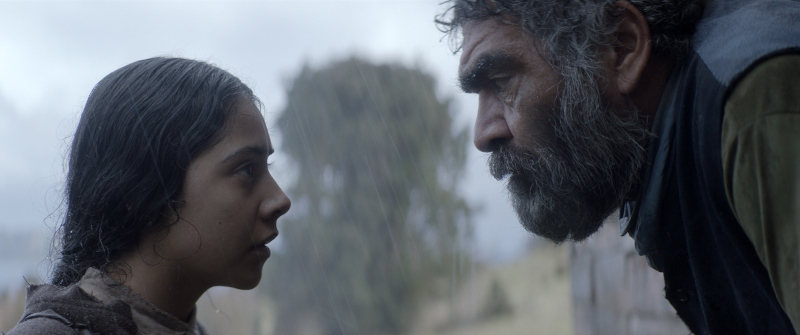
She seeks refuge at the house of local fisherman Mateo (Daniel Antivilo from Neruda, Pablo Larraín, 2016), earning her keep by repairing nets and gutting fish with a knife, a skill she appears to have picked up from her father. He takes her into the woods, where they commune with a tree. I don’t pray, he explains when asked if that’s what he’s doing, then repudiates her Christian idea that her father is in heaven, saying that because he is Huilliche, he is a sea creature.
Later, she secretly observes Mateo and others processing with torches in the woods at night. She starts to embrace their ways, immersing herself fully clothed in the sea, lying amidst dead corpses of small birds who deal with her sorrow by “flying away with it” and, with Mateo’s help, plotting revenge on Stefan using dogs. Dogs killed your father, so it has to be dogs, says Mateo. She spends time with the local weirding woman (Neddiel Muñoz Millalonco, in real life a traditional Huilliche singer), who doesn’t like the term “witch”.
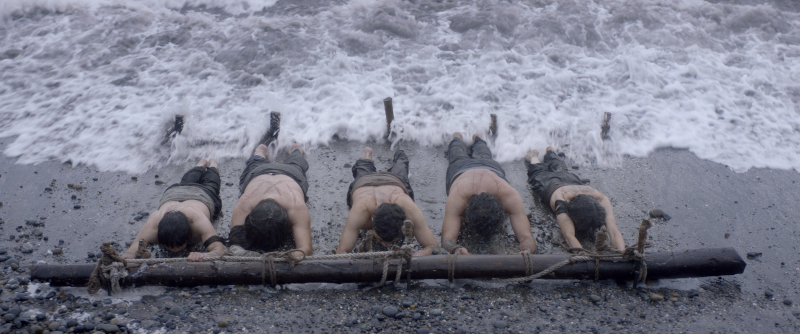
Stefan’s wife finds two dogs in the house and her two boys gone. The mayor has Mateo and others incarcerated and tortured, by being placed face down in wooden frames on the beach so that the incoming tide will cover their heads, a sequence that recalls some of the tortures visited on indigenous Christians by the Japanese in Silence (Martin Scorsese, 2016), although here it’s indigenous people tortured, on behalf of immigrant Christians, for suspected witchcraft. Further arrests follow of the local weirding woman and Rosa, as the former is fitting an apron of human flesh onto the torso of the latter. However, the mayor’s heavily pregnant wife is struggling with a fever, and Rosa helps cure her, believing that this might mitigate the mayor’s intentions of having those he has arrested face the firing squad…
All this is skilfully portrayed and performed on the screen – dialogue is in both German and the local Chilean language – with an emphasis on communing with nature. Weather is much to the fore – numerous scenes feature interminable rain, while others are staged in caves by firelight, in woodlands with torches, in four feet of sea or on a beach. It’s not so much a landscape movie as a natural world up close movie. Simple wooden dwellings and a courthouse, and the organised farming practices of the German immigrants, feel like intrusions upon the natural way of the land. Death is everywhere – in the sheep flock, the killing of Rosa’s father, a potential miscarriage, and the corpses of birds.
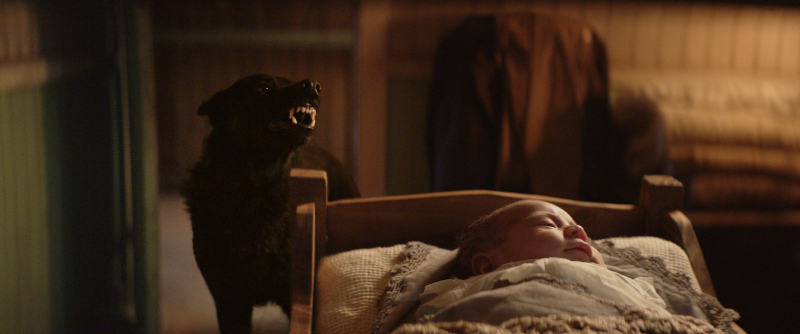
An idea of people transforming or being transformed into dogs is nicely handled, not via the obvious horror movie route of special effects to show everything, but instead by clever staging, camera placement and subtle suggestions in the script. The film gains much in atmosphere from an extraordinary score by Leo Heiblum (Birds of Passage, Cristina Gallego, Ciro Guerra, 2018; Maria Full of Grace, Joshua Marston, 2004).
In terms of Christianity, the narrative portrays outsiders attempting to impose their belief system on a place with its own, indigenous one. Stefan’s Christianity sees no conflict between his faith and fatally setting his dogs on a man who, although brandishing a knife, simply wants to have a talk with him about recent events, albeit a potentially heated talk.
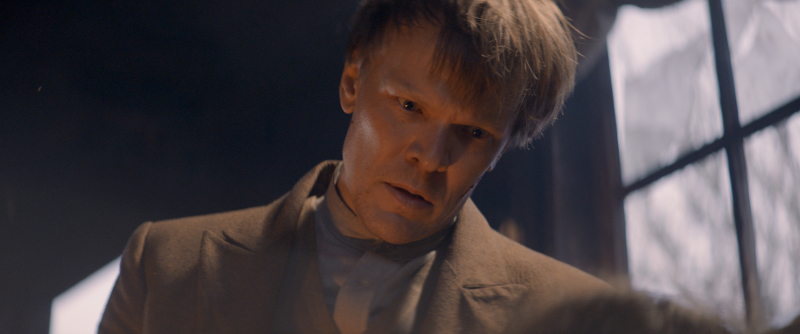
Stefan’s is a personalised faith that fails to apply itself adequately in any wider social context, an omission of which the Christian church or its adherents have all too often been guilty. Then again, the indigenous characters here deal with that via sorcery, a practice prohibited in the Biblical text, so a Christian reading of the film can scarcely whitewash them in the means they use to realise their commendable thirst for social justice.
This movie recalls the animated short Flesh of God (Patricion Plaza, 2022), which explores similar subject matter.
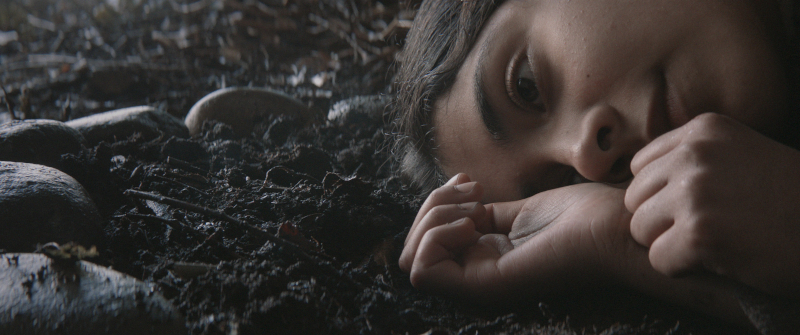
Nevertheless, in her compelling if beautifully understated performance, Valentina Véliz Caileo as Rosa captures something of the painful transition between Christian faith and embracing a more earth- and nature-based belief system. There may be antithetical magical elements there that conflict with her faith, but her desire to see justice done is completely in line with it. A complex and nuanced portrayal indeed. Couple that with the overall feel of the film, its closeness to nature in the way it is both staged and shot, and you have a movie that, whilst somewhat challenging to and problematic for practising Christians such as this writer, is at the same time very special and profound indeed. And absolutely chilling.
Sorcery is out in cinemas in the UK on Friday, June 14th.
Trailer:
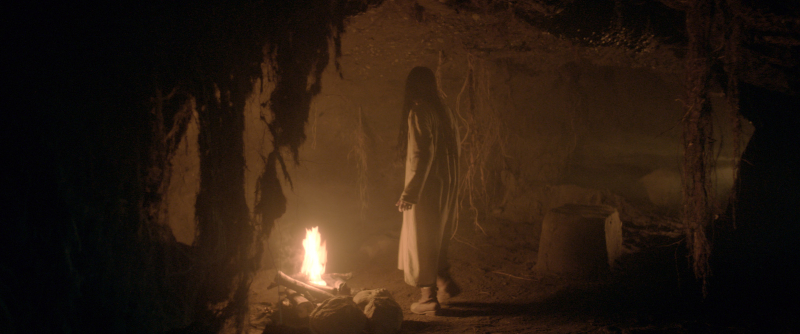
3 replies on “Sorcery (Brujería)”
Is the film available with English subtitles? If so, how can one see it?
The print in UK cinemas had English subtitles. It’s currently available to rent on both Amazon and Sky Store in the UK.
If you’re in a different territory, you could google “JustWatch Sorcery Brujería”.
Thanks. It is streaming on ViX but only with Spanish subtitles.